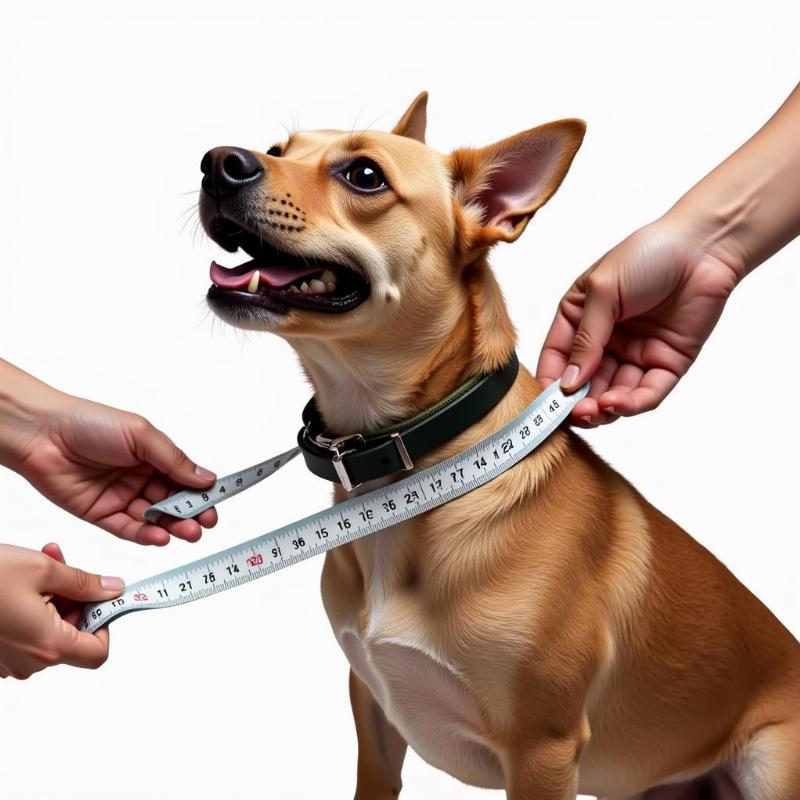Martingale collars are a popular choice for small dog owners, offering a gentle yet effective way to manage pulling and slipping out of traditional collars. They provide more control than a standard flat collar while being safer and more humane than choke chains. Finding the right martingale collar for your small breed is crucial for their comfort and safety. This guide will delve into the benefits, fitting process, and how to choose the perfect martingale collar for your furry friend.
Understanding the Benefits of Martingale Collars for Small Dogs
Martingale collars work by tightening slightly when your dog pulls, distributing pressure evenly around the neck and preventing escape. This gentle tightening discourages pulling without choking or causing discomfort, unlike choke chains or prong collars. For small dogs, this is particularly important due to their delicate tracheas.
These collars are also ideal for dogs with narrow heads, such as Chihuahuas, Italian Greyhounds, and Whippets, who can easily slip out of standard collars. The limited tightening mechanism of the martingale prevents escapes, ensuring your small dog stays safe on walks.
Choosing the Right Size and Fit for Your Small Dog
Proper fit is crucial for both safety and effectiveness. A martingale collar that’s too loose will not prevent pulling or slipping, while one that’s too tight can be uncomfortable and even harmful. To measure your small dog for a martingale collar, use a soft tape measure and wrap it snugly around the widest part of their neck, typically just behind the ears.  Measuring a Small Dog for a Collar
Measuring a Small Dog for a Collar
Once you have the measurement, refer to the manufacturer’s sizing chart to select the appropriate size. Most martingale collars have a range of adjustment, allowing you to fine-tune the fit for your dog’s specific neck size. training collar for small dog
When the collar is on, you should be able to fit two fingers comfortably between the collar and your dog’s neck. The tightening loop should not be so loose that it hangs down, but also not so tight that it constricts your dog’s neck even when they are not pulling.
Materials and Styles for Martingale Collars
Martingale collars come in a variety of materials, including nylon, leather, and metal chain. Nylon is a durable and affordable option, while leather offers a more classic and stylish look. Metal chain martingales can be more durable than fabric options, but may not be suitable for all small breeds. life is good dog collars
When choosing a material, consider your dog’s lifestyle and sensitivities. If your dog is prone to allergies, opt for a hypoallergenic material like nylon. For dogs who enjoy swimming or getting wet, a waterproof or quick-drying material is a good choice.
Introducing Your Small Dog to a Martingale Collar
Introduce the martingale collar gradually to avoid startling or stressing your dog. Start by letting them sniff and investigate the collar before attempting to put it on. Use positive reinforcement, such as treats and praise, to create a positive association with the collar. heavy duty dog chain collar Once your dog is comfortable wearing the collar, attach a leash and practice walking in a controlled environment, like your backyard.
Common Concerns and Misconceptions
Some owners worry that martingale collars are inhumane, but when used correctly, they are a safe and effective training tool. They are designed to provide gentle pressure, not to choke or cause pain. ftr vs briscoes dog collar It’s important to never leave a martingale collar on an unsupervised dog, as they could get caught on something and injure themselves.
Conclusion
Martingale collars offer a safe and effective way to manage pulling and prevent escapes in small dogs. By understanding the benefits, proper fit, and different materials available, you can choose the perfect martingale collar to enhance your walks and keep your small companion safe. cute dog collars for males Remember to always supervise your dog while wearing a martingale collar and never leave it on unattended.
FAQs
-
Are martingale collars safe for puppies? Yes, martingale collars can be used for puppies, but make sure to choose a lightweight and appropriately sized collar.
-
Can a martingale collar be used for training? Yes, martingale collars are an excellent training tool for discouraging pulling and improving leash manners.
-
How do I clean a martingale collar? Cleaning instructions vary depending on the material. Nylon collars can be machine washed, while leather collars require special cleaning products.
-
Can my dog sleep with a martingale collar on? No, never leave a martingale collar on an unsupervised dog, especially while they are sleeping.
-
What if my dog continues to pull even with a martingale collar? Consult with a certified dog trainer for additional training tips and guidance.
-
Are there different types of martingale collars? Yes, there are chain martingales and fabric martingales. Choose the type that best suits your dog’s needs and sensitivities.
-
Where can I buy a martingale collar for my small dog? Pet stores and online retailers offer a wide selection of martingale collars for small dogs.
About Beautdogs.us
Beautdogs.us is your premier source for all things dog-related in the US. We offer expert advice on dog breeds, care, and lifestyle, helping you navigate the wonderful world of dog ownership. Whether you’re a seasoned dog owner or just starting out, Beautdogs.us provides reliable information and resources to ensure your furry friend lives a happy and healthy life. Contact us at [email protected] or +1 501-555-7529 for all your dog-related inquiries.